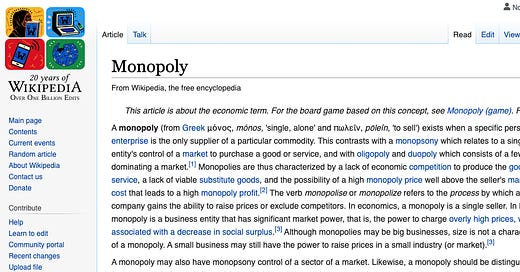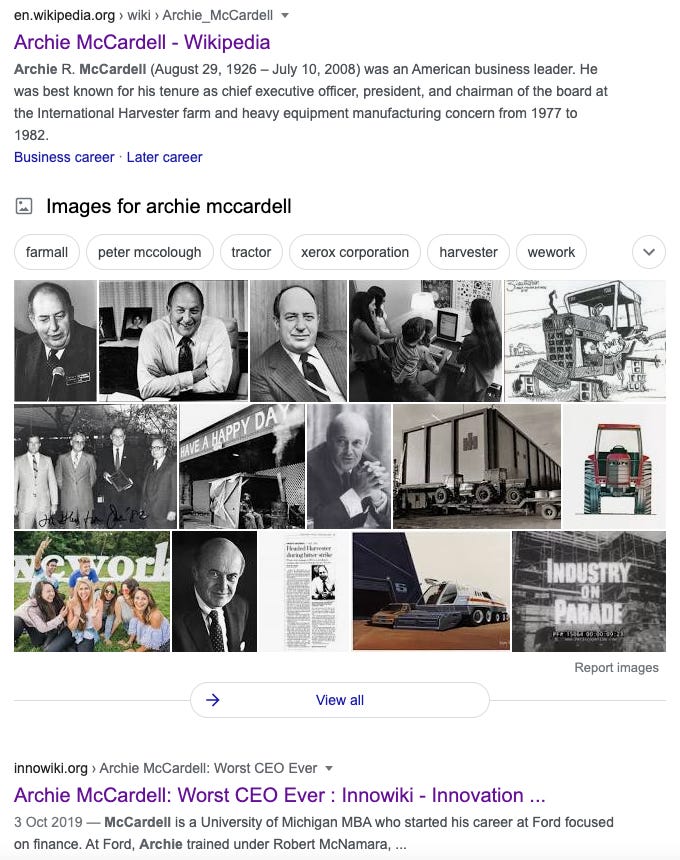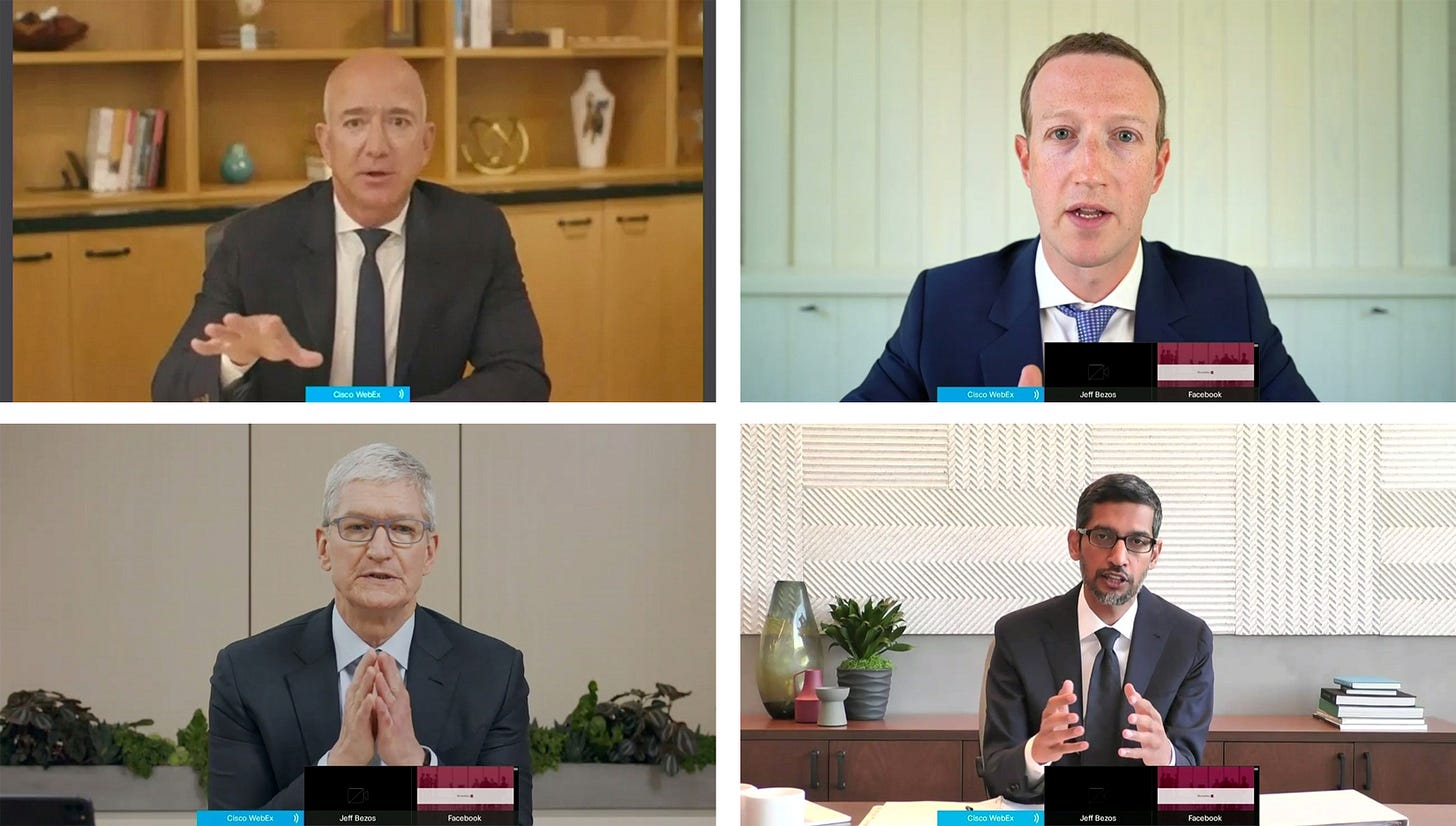Wikipedia: the Overlooked Monopoly
Low-quality anonymous "editors" combined with some type of tie-up to Google have turned an interesting experiment into an overlooked but destructive monopoly.
I realize it’s Biden’s inauguration tomorrow and could write about politics, especially the effect I think it will have on business. But, seriously, there’s a certain amount of burnout. For those who need something else interesting to think about here’s an article reframing Wikipedia as the destructive monopolist that it is.
Please subscribe to this newsletter:
You’ve never heard of Wikipedia’s Tim1965 or the countless others like him but they quietly affect your life and your perception of the world. Tim is a Wikipedia “editor” who brags, in bold, that on June 2, 2019, he made his 50,000th edit on Wikipedia. Just a few months later, on September 4, 2020, the Innowiki consortia I’m a part of got a front-row seat showing how lame that boast is and realized it highlights a serious but overlooked problem with Wikipedia.
What happened is, as these things go, seemingly insignificant enough I paid it no attention for a half year until I thought things through. Specifically, Tim eliminated some quotes I added about my favorite business executive, the late, great Archie McCardell, the worst CEO in history. I’m somewhat of an expert on Archie, having the misfortune of studying and writing about him and even naming an award after him, the Archie McCardell Award for Horrendous Management. Come to think of it, Tim deserves an Archie Award.
Before we get back to the problems about Tim and Wikipedia, the overlooked monopoly, some review is probably in order.
Archie was CEO of Xerox when the Xerox Palo Alto Research Center (Xerox PARC) was set up. It’s the division that gave us pretty much everything interesting about modern computing. He became the President of Xerox in 1971 and for three years, the firm recorded record profits just as it had the prior two decades. Then, with Archie’s management style in place, all quickly started going south and Xerox never recovered. They never commercialized the inventions at Xerox PARC that included, among other things, the graphical user interface, the laptop, ethernet networking (WiFi is wireless ethernet), object-oriented software, or all sorts of other cool and wildly profitable stuff. Steve Jobs swiped stuff from Xerox PARC and used it to create the Mac. Bill Gates knocked that off to make Windows.
Back to Archie; he laid the groundwork for a few years of wretched sales during which they blew the future and ceded the copier market to Japan. As a reward, Archie was recruited by Booz Allen Hamilton to lead International Harvester, then one of the largest businesses in the US. With a starting salary of $460,000, he was one of the highest-paid executives in the US. Archie also received a then unheard of signing bonus of $1.5 million and a low-interest (at the time) loan of another $1.8 million. Before Archie, International Harvester was a profitable, stable family business but management consultants wanted “a high-powered executive from the outside.”
So, how’d the guy that ensured Xerox wasn’t Apple do at his new gig? Every bit as wretched as you’d imagine and worse. He cut costs and poked the lead union, the United Auto Workers (UAW), in the eye. They responded with a 172-day strike.
By the time the strike ended, Harvester lost $479.4 million-plus another $397.3 million the next fiscal year as a result of the fallout. Archie borrowed money to stay afloat, eventually bloating the firm with $4.15 billion in debt. Eventually, he cut the budget another $200 million and demanded further union concessions while paying out $6 million in executive bonuses. The union agreed to the concessions on May 2, 1982; Archie was fired the next day. International Harvester was forced to sell their crown jewel, the farm equipment division, and renamed what remained Navistar.
Archie’s feelings about his performance (copied from my original articles):
“I don’t think we made any one major mistake,” McCardell said in a 1986 UPI interview. “I feel very good about my years at Harvester.” Later, he adds, “I think I was underpaid.” In a different interview with the New York Times he said: “I think I rate myself superb.”
Pundits aren’t as enthusiastic. One speculated he might have been carrying out “an industrial sabotage operation.”
Back to Tim & Wikipedia
My Innowiki project is edited by a small number of people. We typically write under the moniker Ruby Day because WordPress requires attribution. Tim, with his 50,000 edits, apparently watches the Archie McCardell page for edits. He deleted the quotes above and justified the deletion writing: “removing biased source (self-promotional edit, using an article written by the editor), linked to nonreliable wiki source…”
So, what’s the problem?
Well, for one, the source, here, clearly has all information including quotes well cited. That Innowiki entry ranks #2 or #3 in Google, depending on the day, with Wikipedia ranked #1. That is, there’s no point in self-promoting: there’s no higher placement for that page except to overtake Wikipedia which isn’t going to happen. All that was apparent to anybody who did the slightest bit of research, something Tim1965 clearly didn’t bother to do before pressing delete and justifying it with baseless ad hominem insults.
This happened in September and I shrugged it off. After all, there really is no SEO benefit. Adding those quotes only helped contextualize Archie McCardell, improving the page to better reflect his mindset that eventually metastasized into modern management practices. But I have a family, a day job, my other writing, and a life; no need to have a war with some dude who has the time for 50,000 Wikipedia edits.
Something didn’t feel right and I eventually figured it out. That Wikipedia entry about Archie, presumably written by Tim, doesn’t contain those quotes and materially misstates other information. It’s oddly appropriate that a key article about Archie is run by a lazy researcher exhibiting poor scholarship but it seems inappropriate for Wikipedia.
More to the point, why is some anonymous creep in a position to run around hurling ad hominem attacks? Why should some dude who has the time to make 50,000 Wikipedia edits and goes by the anonymous “Tim1965” be in a position to whine about that the author of a third-party source filled out a Wikipedia entry (which isn’t even entirely true, though that’s a different issue)? Especially because he’s doing exactly the same thing? What gives him the authority?
I thought about it and realized: Wikipedia’s source as a monopoly is what.
Wikipedia is a monopoly.
And it’s not a harmless one, either. Editor ranks are filled with people just like Tim1965. They’re unpaid basement dwellers who have some motive to spend enormous amounts of time “editing,” a process that invariably often includes the mass deletion of useful and accurate information. Look - maybe Tim et. al. would fine if the attribution of my edits were to other primary sources but, of course, that would cut out other secondary sources. This happens to be exactly what monopolists do. Google at least still links to underlying websites even if, as illustrated above, they push them below a barrage of pictures.
But Wikipedia is a non-profit with volunteers, huh? Nonsense. Wikipedia’s no-pay policy is a bug, not a feature. Facebook, Google, and Amazon are also monopolists but at least they allow some people to buy food, shelter, and diapers; Wikipedia doesn’t. Wikipedia is not only a monopoly; it is the very worst monopoly, one that saps wealth, erodes knowledge, spreads false or misleading information, allows anonymous edits, and returns nothing to the economy. It props up Google’s ability to circumvent eyeballs strengthening their own monopoly (again, as illustrated in the screenshot above). Why does anybody think this is a good thing?
Almost nobody recognizes the problem or calls out Wikipedia as a monopoly despite that it obviously is. There is some unspoken rule that Wikipedia is good and mustn’t be challenged. That tie-in with the high Google ranking? Sure - Wikipedia deserves it, goes the thought. Why? Because they don’t pay people and don’t accept advertising so there are no conflicts of interest, right? Wrong.
Only the very naive believe somebody would bother with 50,000 edits for no gain. A quick search for Wikipedia experts returns countless people who can help “manage” one’s Wikipedia presence to see how plenty of these “editors” are paid. It’s the same model as Google or Facebook but a whole lot less honest. That doesn’t mean many people don’t volunteer their time: I write plenty for free. But there’s a big difference between releasing a newsletter/blog post once or twice and week and 50,000 edits. There are other ways to profit from an edit count with none of them adequately disclosed.
Sure, Wikipedia has a code of ethics. Even that’s a joke. I’m an American living in France so often surf the web using a VPN to get English-language pages. I have to turn the VPN off to make Wikipedia edits. They block VPN edits better than any other VPN blocker I’ve ever seen. I can watch Netflix as if I’m in the US but can’t even login to Wikipedia with the VPN on. This is a minor inconvenience to me but literally deadly to, say, dissidents of many countries.
Just how common are people like Tim on Wikipedia? Plenty common and plenty of a problem. The way most of them get to those high number of edits is by reckless deletions — digital vandalism — as I’ve illustrated above. Wikipedia even has a term for them, deletionists. They used to have their own Wikipedia page when I first came across the term but deletionists deleted it. Instead, in a self-righteous bit of false equivalency, they merged it in with a page of so-called “inclusionists” who are people that want to actually expand knowledge.
Deletionists define adding information they may not like — I suppose including links to other well-documented articles in other places — as “vandalism” and edit for “appropriateness of content,” a vague-standard that sounds like something from the North Korean Ministry of Truth. Borrowing from Richard Stallman, knowledge should be free as in speech, not free as in beer for those who can afford it. Wikipedia has it exactly backward.
Monopoly Busting
There’s finally some momentum to police “Big Tech” monopolists from both the left and the right. We’re used to seeing Bezos, Zuck, Pichai, and Cook uncomfortably suited up and testifying on Capitol Hill. Lately, the people asking the questions even seem to be more tuned-in to issues that matter.
Ignoring Wikipedia, which is every bit as much a monopoly and a monopolist as the rest, is a dire mistake. There is nothing positive about sucking away users from high-quality content published by individuals, small blogs, or focused wikis. They’re not providing some type of public service by providing free content for Google to monetize without worries about being sued for copyright violations (and, surprise, Google funds Wikipedia). Wikipedia went dark to prove the point they’re vital and immediately missed. However, by doing that, they simultaneously proved another point: they’re a monopoly.
Next time tech execs are called up to testify, Jimmy Wales should join the gang. Until then, Google and the rest should work to promote some diversity of information by pushing Wikipedia’s rank down or even throwing the site off search results entirely; if people want to search Wikipedia they can go there directly. In its current state, all Wikipedia does is concentrate, corral, and offer up eyeballs to their for-profit monopolist cousins while purposefully harming lesser-known sites.
Still not convinced and think Wikipedia is a cute and cuddly non-profit? Let’s keep going. Wikimedia Foundation, the parent of Wikipedia, brought in $113 million on their last tax return, filed 2017. They don’t pay writers but do pay a lobbyist. Executive Director Katherine Maher earned $356,641. The CFO and Treasurer (of the non-profit volunteer website) earned $260,519. The lowest-paid executives are Chief of Community Engagement Angela Reid ($154,707) and Director of Engineering Trevor Parscal ($127,547). Yes, you read that right: the two people in charge of the community that creates the content and keeping the site lit up — the only two things the vast majority of us care about — are, by far, the lowest-paid.
There’s something poetic about a seemingly insignificant edit on the Archie McCardell page reframing the core brand of Wikipedia as the monopolist that it is. If any executive could screw up something from the grave, a dozen years after his death, it’s Archie. Still, he also has a history of leaving interesting ideas in his wake of destruction. One of those ideas is that it’s long past time to recognize the value of researchers and writers, to label Wikipedia the monopolist that it is, and to reorient public perception towards the site to recognize its economically destructive nature on individual independent researchers and journalists.
I agree wholeheartedly with this pinned tweet by Katherine Maher but disagree entirely that Wikipedia does this. Enabling creepy anonymous unpaid editors and providing free content for search engines to bypass independent writers achieves the opposite of this goal.
Please share this post:
Please subscribe to this newsletter:












You have identified the right problem, but you're talking to the wrong people, and as written, your piece is from the wrong person to get results. Wikipediocracy are just as much an abuser of a monopoly status as Wikipedia. Their forum is awash with Wikipedia editors, including extremely high ranking members of the site's governance system, none of whom relish a future where Wikipedia either ceases to be a monopoly or otherwise comes under the same regulatory or indeed public scrutiny as Facebook or Google. You made the classic miatake of not appreciating why your edit was rejected, for understandable yet misguided reasons, which is what Wikipedia's editors and corporate owners will seize upon to discredit the rest of the piece well before it gets to the stage it would reach who it needs to reach. People like me, serious and knowledgeable critics who do actually want to end Wikipedia's dominance, are the only ones who can help you. If you want specific help turning your piece into something that could do serious damage to Wikipedia, largely by editing our your mistakes and perhaps adding even more juicy details about the largely unknown dark truths of Wikipedia (citogensis, an objective measure of their lack of quality, a brief history of how they came to be all about PR and money at the executive level, and indeed, the nightmare future of where this is likely all going, which encompasses a fundamental legal truth contrasted against a whopper of a public benefit claim) you can find me (and Eric Barbour for that matter) at the forum called Wikipedia Sucks.
Many of us on the left of politics have been concerned about Wikipedia editors for some time. Take some time to research the remorseless antics of 'Philip Cross' and his round the clock edits - a good place to start is here:
https://www.craigmurray.org.uk/archives/2018/05/the-philip-cross-affair/